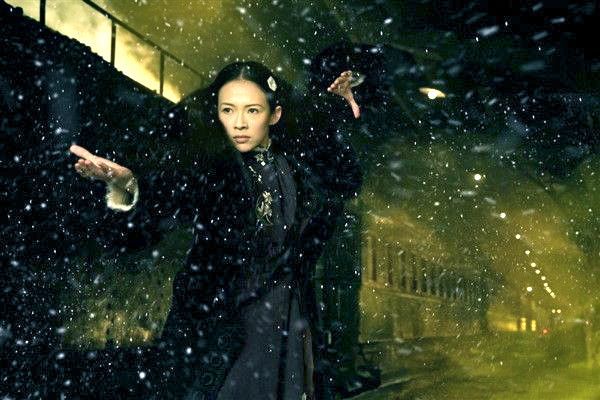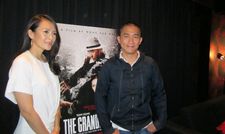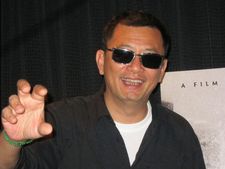 |
| Ziyi Zhang as Gong Er in Wong Kar Wai's The Grandmaster - a martial arts Anna Karenina with fur cuffs. |
Wong Kar Wai knows how to frame faces like no other, with embroidered collars, white straw fedoras, a rowdy monkey, cotton flowers and words escaping lips that are like song.
Anne-Katrin Titze: You created a scene that fulfilled a wish I didn't know I had. The scene at the train station. That's how I would have liked Anna Karenina to end.
Wong Kar Wai: Right! That's very strange. You know, two weeks ago, we had a screening at the Academy [of Motion Picture Arts and Sciences] in Los Angeles and Matthew Weiner [creator of Mad Men] introduced the film. After the screening he sent me a message. He said "Well, I would call this film Doctor Zhivago versus Kung Fu. And the last scenes remind me of Anna Karenina."
AKT: Can you talk about the gender issue in your film? You have some grave lines such as "You're a woman, you don't count" to explain the historical situation.
 |
| Ziyi Zhang and Tony Leung in The Apartment for The Grandmaster. Photo: Anne-Katrin Titze |
Gong Er, in a stupefying performance by Ziyi Zhang, is a martial arts Anna Karenina with fur cuffs as she battles for the family honor in front of a train that, like a never-ending strip of film, flickers in dangerous momentum. Ip Man, the hero of this tale, is played with gravity and remarkable poise by the wonderful Tony Leung, whose tenderness matches his physical art.
WKW: First of all, Tony and Ziyi are not from a martial arts background. All the action scenes I wanted them to perform themselves. So with all the action scenes you have to be very precise. You need to take weeks of choreographing and rehearsal. Also, there are so many stories about Ip Man. I wanted to tell the story of Ip Man that is true, that is historically correct. I don't want to show him like just a fighter, make up some episode of fighting Japanese or Western fighters because it did not happen. What I find more heroic is for Ip Man to fight not a physical opponent but fighting with the time, the ups and downs. When we look at his life story - he was born with a silver spoon and at the end of his life, he lost almost everything, except the commitment to his martial arts.
At the start of the film, the whispers and threats, for the kung fu amateur do not carry much meaning, as the battle dances in the rain impress with sheer strength and beauty of line. Throughout the episodes, group photos freeze history for a second. In a game of matching wits, can you break the cake in the hand?
WKW: The camera is always moving. We wanted to make sure that all the moves are precise and correct. And sometimes you work with trainers who are all the masters of that school. They don't know about film, though. You have to carefully ask them to do the demonstrations to see what is actually the essence of the move. A punch is not really about the fist, it's the co-ordination of the whole body. How the foot works and the twist of the body and the shoulder and you have to show the power of the strike. That's why we need the rain, we need the snow because we can see the contrast. We have it shot with different speeds of the camera to capture that.
 |
| The Grandmaster director Wong Kar Wai Photo: Anne-Katrin Titze |
Music becomes an additional velvet embrace. Stabat Mater dresses a glance between a couple in combat, a couple never to be.
WKW: To tell a story you need to have a rhythm. Not for myself. I need to have a rhythm to co-ordinate between the camera and the actors. The blocking of the camera has to work in a certain way - so I want them to be in synch, they know the rhythm of the move. So music is very effective.
When a master from the North Gong Yutian proclaims his retirement, he is curious to meet and challenge Ip Man. Ip Man's daughter Gong Er, whose face keeps your gaze captive, holds her own.
WKW: When you look at the film, it basically has three chapters. One chapter is in the south in the 1930s, the other chapter is in the Forties in the north in the Manchurian states and we also end up in Hong Kong in the Fifties. Half the film is about people from the North. Because of the language and the dialects, it's really hard for me to do it by myself. So I need very good writers. I'm very lucky to have two partners [Xu Haofeng and Zou Jingzhi] because they are all based in Beijing and one of them is also from Manchurian background.
"In life as in chess, a move once made stays on the board", the man says to the woman.
 |
| Tony Leung as Ip Man in The Grandmaster. Wong Kar Wai: 'I wanted to tell the story of Ip Man that is true, that is historically correct.' |
The sense of choice in Wong Kar Wai's hypnotic The Grandmaster is touch, as he has the earth moving with powdery and glamorous colors decaying at the edges in unremitting longing.
The Weinstein Company is releasing the film theatrically in New York, Los Angeles and Toronto on August 23 and nationwide in the US on August 30. As yet, no UK release date for the film has been set.





















